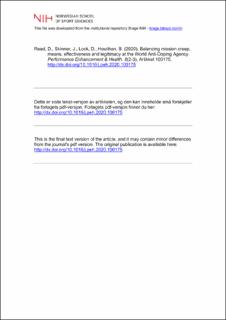| dc.contributor.author | Read, Daniel | |
| dc.contributor.author | Skinner, James | |
| dc.contributor.author | Lock, Daniel | |
| dc.contributor.author | Houlihan, Barrie | |
| dc.date.accessioned | 2022-11-22T14:10:20Z | |
| dc.date.available | 2022-11-22T14:10:20Z | |
| dc.date.created | 2020-12-21T17:18:35Z | |
| dc.date.issued | 2020 | |
| dc.identifier.citation | Performance Enhancement & Health. 2020, 8(2-3), Artikkel 100175. | en_US |
| dc.identifier.issn | 2211-2669 | |
| dc.identifier.uri | https://hdl.handle.net/11250/3033455 | |
| dc.description | I Brage finner du siste tekst-versjon av artikkelen, og den kan inneholde ubetydelige forskjeller fra forlagets pdf-versjon. Forlagets pdf-versjon finner du på sciencedirect.com / In Brage you'll find the final text version of the article, and it may contain insignificant differences from the journal's pdf version. The definitive version is available at sciencedirect.com. | en_US |
| dc.description.abstract | Established in 1999, the World Anti-Doping Agency (WADA) was an ambitious project to harmonise anti-doping regulations globally. Since its creation, WADA has engaged in additional activities such as investigating doping allegations, managing whistleblowers and coordinating with national and international customs organisations. These activities demonstrate ‘mission creep’, a term denoting that WADA’s purpose has broadened from its original responsibilities. Lawrence (2008) argues that the relationship between an international non-governmental organisation’s legitimacy to regulate an issue and mission creep is related to its means (i.e., physical and non-physical resources) and effectiveness. This article explores how WADA’s mission creep has influenced its perceived legitimacy as the regulator of anti-doping, globally. Following analysis of 14 interviews with occupationally and globally diverse anti-doping professionals, three themes were identified: code implementation, representation, and conflicts of interest. It is argued that the legitimacy of WADA to regulate anti-doping has been weakened due to tensions created by responding to emerging challenges in order to maintain legitimacy, whilst trying to secure means. These tensions have diverted resources to new activities and, therefore, reduced WADA’s effectiveness in other activities; paradoxically undermining its legitimacy. Consequently, it is advised that WADA prioritises its responsibilities, looks for additional sources of means and addresses democratic deficiencies. | en_US |
| dc.language.iso | eng | en_US |
| dc.subject | anti-doping | en_US |
| dc.subject | WADA | en_US |
| dc.subject | legitimacy | en_US |
| dc.subject | mission creep | en_US |
| dc.subject | world anti-doping code | en_US |
| dc.title | Balancing mission creep, means, effectiveness and legitimacy at the World Anti-Doping Agency | en_US |
| dc.type | Peer reviewed | en_US |
| dc.type | Journal article | en_US |
| dc.description.version | acceptedVersion | en_US |
| dc.source.pagenumber | 9 | en_US |
| dc.source.volume | 8 | en_US |
| dc.source.journal | Performance Enhancement & Health | en_US |
| dc.source.issue | 2-3 | en_US |
| dc.identifier.doi | 10.1016/j.peh.2020.100175 | |
| dc.identifier.cristin | 1862487 | |
| dc.description.localcode | Institutt for idrett og samfunnsvitenskap / Department of Sport and Social Sciences | en_US |
| cristin.ispublished | true | |
| cristin.fulltext | postprint | |
| cristin.qualitycode | 1 | |
